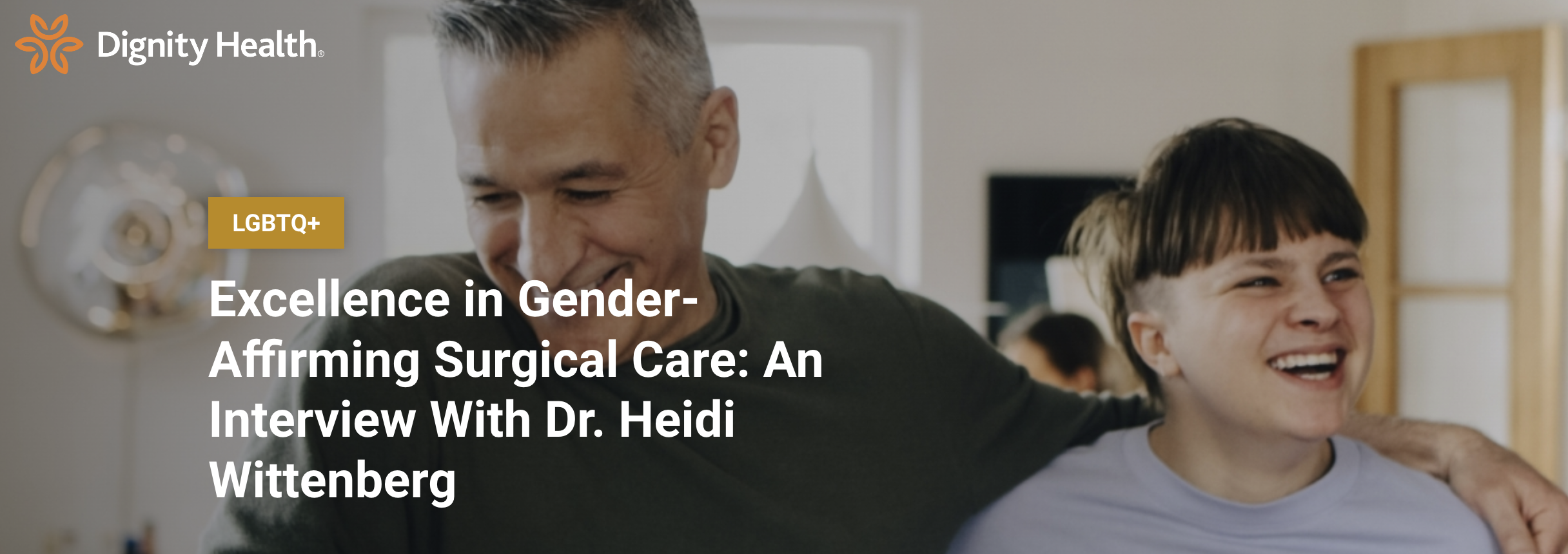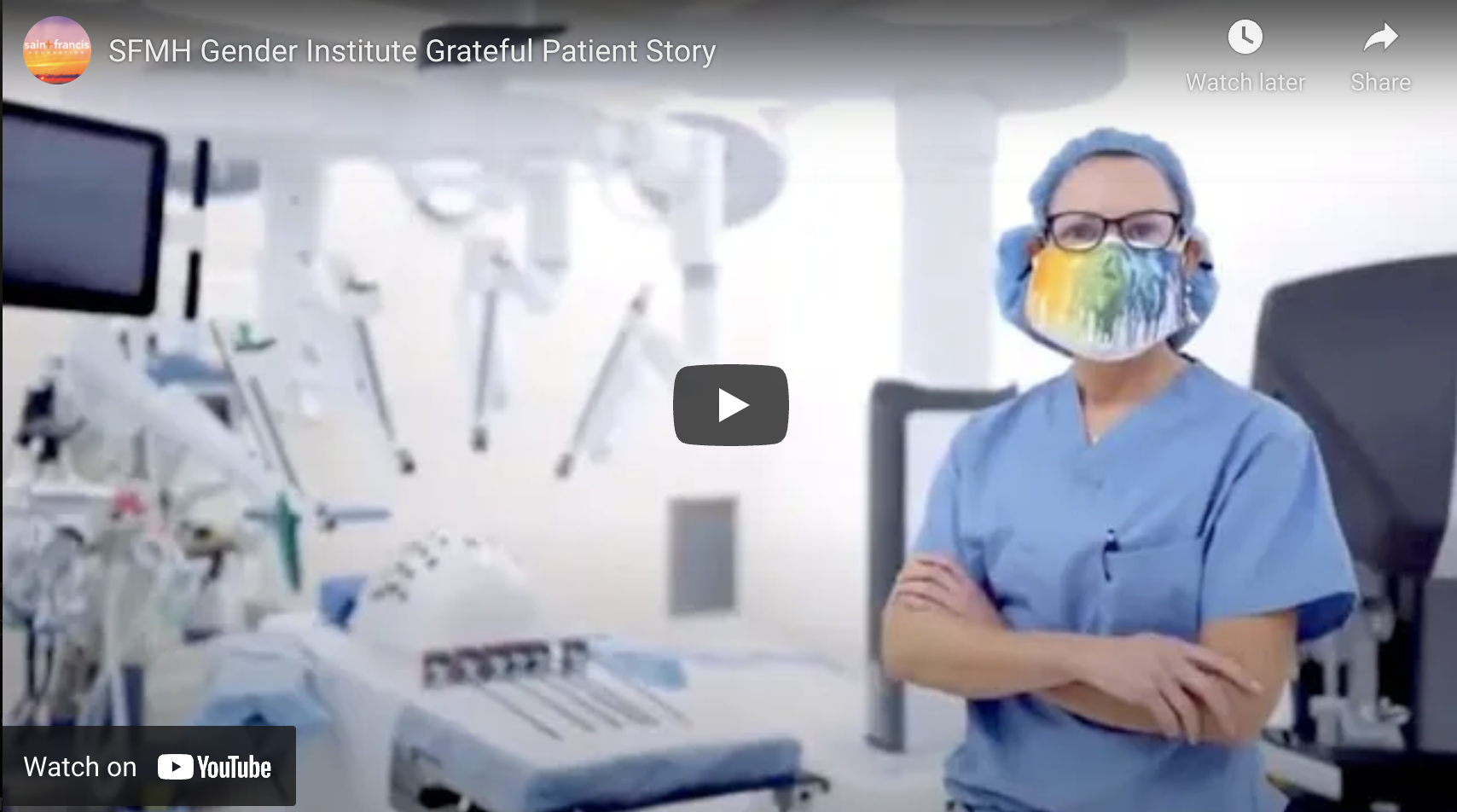Dignity Health’s Saint Francis Memorial Hospital has been caring and advocating for LGBTQ patients and their families for decades—and has been recognized as an LGBTQ Healthcare Equality Leader by the Human Rights Campaign (HRC) for its commitment to LGBTQ health equity. That commitment shines brightly within the Gender Institute at Saint Francis.
At the heart of the Gender Institute is a council of transgender health experts and community members dedicated to continuously assessing and addressing the needs of transgender patients. Guided by this council, the Institute has become home to a group of dedicated, highly experienced clinicians who offer a wide range of transgender medical services, bridging gaps in care within San Francisco and beyond. The Institute has also committed itself to transgender health education, training Saint Francis staff, and partnering with the World Professional Association for Transgender Health (WPATH) to hold a groundbreaking conference in 2019.
The Gender Institute officially, named and formed in 2016, is led by Medical Director Dr. Heidi Wittenberg. In this interview, Dr. Wittenberg shares what attracted her to Saint Francis Memorial Hospital and the Institute, what makes it unique and why she’s inspired by her patients.
Can you describe the Gender Institute?
The Gender Institute has the goal of taking care of transgender and gender-expansive patients who don’t have a dedicated place to go. We have created and want to further create a safe space to provide the best care for these patients. We have a long history of taking care of this population, which is very vulnerable and often does not seek out help. We’re right there at the forefront of medicine in providing care to these patients.
What inspires you about the transgender community and the patients you work with?
There are so many obstacles these patients have to go through, and when I started doing gender-affirming surgeries in 2015, we weren’t seeing the younger generation that had supportive parents. We were seeing older patients that were experiencing the pain of coming out and not being supported by families, friends, and loved ones.
So, the inspiring stories for me are people staying true to themselves and working through their journeys. And I just loved when I saw someone with their significant other or family member that loved them for them. That partner loved them and supported them through the process. I find that so inspiring when I see it. Unfortunately, most patients have not had love and support. They have been left by family, partners; they have been ostracized, even abused and assaulted. So to see our patients persevere through these struggles and hurtles, survive, and then thrive, is also inspiring.
What’s your background, Dr. Wittenberg?
I started practicing in San Francisco in 1999 as an OB-GYN, and I delivered babies for over a decade. But really my specialty was and is female pelvic medicine or reconstructive surgery. I was recruited by a local transgender-only surgical practice because of my history. People ask me why would I take on additional training and expertise… and I thought, “Why wouldn’t I help?!”
I trained with that practice for a year, did a fellowship with them, and decided to concentrate on gender-affirming surgery. This was so in line with my background, training, and expertise that it just made sense. I’m now 100% focused on transgender, gender diverse, and gender-expansive surgery. I feel like I have come full circle and I’m delivering babies into the world as they should have been born.
How did you come to work at the Gender Institute?
I’d been working at Saint Francis since 2005 as a gynecological surgeon, but over time decided to do more of my surgeries there, because of how well my patients were treated. I am honored to be the medical director of the Gender Institute which became formalized in 2016.
Nicky Calma, San Francisco Community Health Clinic (Left); Dr. Heidi Wittenburg, Medical Director of Saint Francis Memorial Hospital’s Gender Institute (Center); and Dr. Lin Fraser, former President of WPATH (Right)
What makes the Gender Institute unique?
San Francisco has—though there are not many of us—the most transgender and gender-expansive surgeons, who offer the whole gamut of gender-affirming surgeries. We’re really fortunate. I think other areas of the country are going to grow their practices, but we have the largest number of experienced surgeons, to the point that surgeons come to train with us here and our patients are national and international.
The Gender Institute also has received philanthropic support from the Saint Francis Foundation and associated partners like Merck Foundation, Cigna Foundation, and Sierra Health Foundation. Saint Francis Foundation has helped ensure funding for health navigation, substance use referral programs, and essential technology and equipment that help ensure high-quality care to attract patients and care providers.
Some of the forefathers of transgender and gender-expansive surgery came from San Francisco, so that’s part of our heritage and history. And a lot of our surgeons at Saint Francis were with those early practices or evolved from those practices, and practice at the Gender Institute today. There are 15 highly experienced surgeons that are part of the Gender Institute—in this field, that’s a large number.
How do patients get referred to you?
The biggest referral driver to Saint Francis, because of the level of experience of our surgeons, is the patients themselves—word of mouth. We don’t advertise. Our patients talk, and the more you do for the patient population, the better the reputation gets. Our patients aren’t just from California; they’re from all over the country and international.
How does Saint Francis approach transgender and gender-expansive patients?
Saint Francis has done a lot of intentional work to train staff on transgender and gender-expansive patients—for example, using appropriate names and preferred pronouns. It’s been working with everyone from registration to nurses to dietary and beyond. It was and is a concerted effort.
I have worked in multiple different hospitals over the years. I would have to do damage control often at these other places because someone got misgendered or called by a deadname. At Saint Francis, it’s so rare for things like that to happen. It’s been a joy to feel that my patients are safe here.
Saint Francis gets it, and I don’t have to stomp out fires, do damage control or educate people again and again about things that should really be, in this day and age, common knowledge. Saint Francis has the heart, it has the training, it was in the forefront—it really knows how to take care of our patients.
What would the general public be surprised to know about Saint Francis or the Gender Institute?
Saint Francis and Dignity Health have been portrayed by some as being not LGBTQ-friendly or not women-friendly. Not only did St. Francis & St. Mary’s Medical Center rise to the occasion to take care of AIDS patients during the 1980s, but it was also among the first to reach out and care for this population. And there’s actually a long and rich history of Saint Francis doing transgender and gender-expansive surgeries and supporting the community. Dr. Edward Falces performed pro-bono surgeries here for transgender patients in the 1960’s, followed by Dr. Lesley Hovey, Dr. James Kauth, and Dr. Doug Ousterhout. The Gender Institute evolved because there was a crew and legacy of surgeons already doing these procedures at Saint Francis. It was a natural evolution to elevate the work, do more teaching, and provide more services for our patients.
We’ve been teaching residents, students, and attending physicians. They come over to observe and learn about surgery. They watch us in our clinics. We’ve established a long history of supportive services. We’re developing more. We want to continue helping not just local but other institutions and health professionals—providers, nurses, and students—to continue to grow in this field and make sure we are all providing the best care for our patients.



